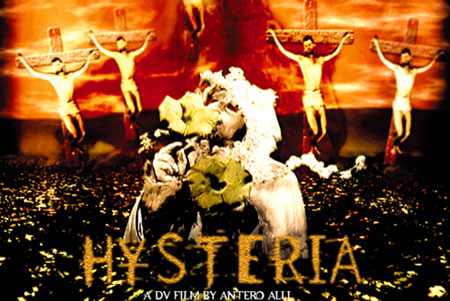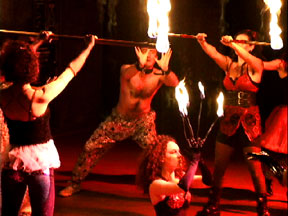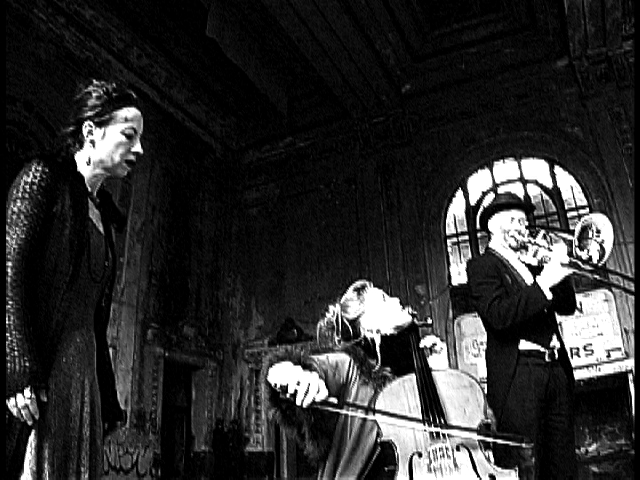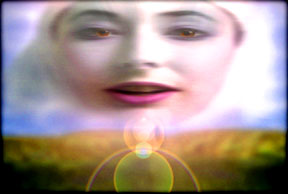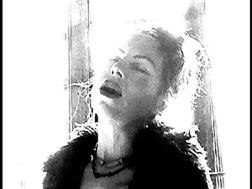Film Review by Phil Hall
for filmthreat.com (five stars out of five); 4/12/02
HYSTERIA (2002; 83 min. USA)
During the past decade, the Finnish-born/Berkeley-based filmmaker Antero Alli has created an astonishing selection of features, shorts and documentaries which dissect the human condition with surgical precision. His new feature "Hysteria" was created in the aftermath of the September 11 tragedy, which is an admittedly tricky and potentially exploitative action considering the raw pain that many people still feel from the events of that horrible day. Yet, rather than replay the images of September 11, "Hysteria" forces its characters (and in turn, the audience) to weigh in on emotional issues that haunted America as a result of the tragic events from that day: the damage created by religious dogma, the terror in dealing with inner fears, and the inability to justify a societal mind frame built on a foundation of selfish behavior.

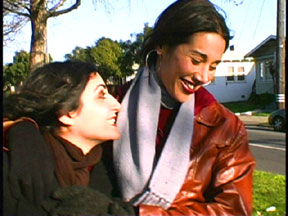
Atosa Babaoff and Anastasia Vega
"Hysteria" takes place in a small apartment building in Oakland, California, during October 2001. Long-time resident Marion (Atosa Babaoff) is playing host to her sister Peri (Anastasia Vega), who had lived in New York for the past two years but abruptly fled home to the West Coast following September 11. Peri is a self-absorbed and somewhat bratty woman who is not given to tipping her hand and allowing others to see what she's carrying. She speaks nonchalantly and perhaps crassly about post-September 11 New York, yet there are clues of a disturbing undercurrent which may explain her abrupt West Coast exile: vague talk about breaking a romance with a New York cop because she preferred his on-duty persona to his off-duty personality (was she unable to deal with his traumatic reaction to the disaster?), and a defensive rebuke at being identified as being of Iranian descent (she insists on being called "Persian," as if to distance herself from being part of a perceived terrorist culture and the harassment such connections would bring).
Across the hall from Peri and Marion is Ikar (Jakob Bokulich), a boxer from Croatia. Despite outward appearances of physical power, Ikar is an emotional time bomb with a fuse burned up in flame of troubled memories. As a child in Croatia, he was among a group of youngsters who claimed to see the Virgin Mary. But he only saw the Virgin Mary once while his peers saw her more often, so he was shunted aside while the other children received global publicity for their visions. As a young adult, he served in the Croatian army during the Yugoslavian civil wars of the early 1990s. While on-duty in a decaying church set for demolition, he was given a pot of tea by gypsies that (unbeknownst to him) contained hallucinogenic datura root which unleashed new visions of the Virgin Mary. Although he eventually left the civil wars for a new life in America, he could not purge the need to fight and thus embraced boxing with a mania.
While Ikar would prefer to keep to himself, his new neighbor Peri is happily intrigued by his virile appearance and forces her way into his presence. Marian thinks less of Ikar and vainly tries to get Peri to pay more attention to their parents, from whom Peri has been estranged and for whom she shows no signs of sparking a reunion. Ikar, who is slightly amused with Peri, allows her flirtation to proceed...but things suddenly go horribly awry when Peri's invitation for Ikar to join her at a twilight-hours party triggers a sign from his last Virgin Mary vision of a duty which he believes he must follow as part of Heavenly orders.
Throughout his films, Alli focused on the subjects of emotional isolation and rabid obsessions, and his characters have a self-destructive habit of locking themselves into prisons of their own making: the dying patriarch lost in his surreal dreams in "The Oracle" (1993), the bitter artist consumed by daydreams and professional solitude in "Lily in Limbo" (1994), the futuristic society whose over-reliance on technology has nearly eradicated person-to-person communications in "The Drivetime" (1995) and the techno-pagan worshipers hunted by a fundamentalist Christian district attorney in "Tragos" (2000).
In "Hysteria," the three main characters bring new depth to this brutal focus: Ikar's endless pugilistic training and consuming devotion to Catholic iconic symbols, Peri's heliocentric self-worth and her casual disregard for the feelings of others, and Marian's self-sacrificing martyrdom as sister and daughter to the point where her own identify is obscured. The overlap between these three people creates dangerous new ground which none are fully prepared to endure, resulting in a powerful and mature drama that covers issues of Heaven and Earth.
Much of the force in "Hysteria" comes from the performance of Jakob Bokulich, who co-wrote the screenplay with Alli. Bokulich is a sturdy and handsome actor who clearly has camera presence, and as a performer he adeptly underplays the religious mania that fuels his life...thus laying the stage for an underlying menace which becomes all the more terrifying as the plot winds its way. Rather than coming across as an eye-rolling, hymn-shouting fanatic, his obsession is matter-of-fact and without any hint at the loose wires fraying within his mind. When Peri asks him to set a time to meet at a twilight hours party, he nonchalantly opens his Bible and lets his finger fall to a verse that boyishly announces will be the set time of their rendezvous: at 1:07AM, in tribute to Revelations 1:7. As the sisters in conflict with each other and their odd neighbor, Anastasia Vega's Peri and Atosa Babaoff’s Marian are wonderfully paired and offer fully dimensional performances of wit and pathos.
As with all of Alli's films, "Hysteria" is rich in stunning visuals: the nightmarishly surreal flashback in the Croatian church where a trio of disheveled performers offer an elegy to the doomed structure, the scene of the Virgin Mary's appearance in which her eyes literally float out of her head while she is speaking, the bleak gym where Ikar's pent-up fury is directed against an anonymous opponent in a rain of fists, a fire-dance party where performers spin in wild and reckless abandon, and a darkly hilarious throwaway sight gag where a jolly toy depicting a scene from "Yellow Submarine" is juxtaposed against a brutal image which wholly antithetical in mission and message.
Framing the film, as with Alli's other films, is the musical input of his reel and real-life collaborator, the singer/composer Sylvi Alli (herself a wonderful screen presence who is seen, albeit too briefly, in the church sequences). "Hysteria" is a profound and frequently disturbing work of intelligence which solidifies Antero Alli's place among the most talented contemporary filmmakers. The superior level of artistry and honesty achieved in "Hysteria" is so rare to find that this film can easily be classified as an instant classic.
(five stars out of five)
ANTERO ALLI - Vision Statement
"HYSTERIA" - Other Reviews and Stories
"HYSTERIA" - Behind the Scenes
